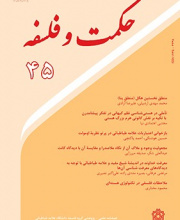
مقالات
تفسیری درباره تصویر کانت از عقل در نقد اول
معرفت شناسی ژنتیک (تکوینی) در دیدگاه پیاژه
حوزههای تخصصی:
معرفت شناسی ژنتیک (تکوینی) پیاژه، دست کم تحت تأثیر چهار منبع بوده است: فلسفه کانت، ساخت گرایی ریاضی بورباکی، زیست شناسی، و سیبرنتیک. تأثیر کانت را می توان در توسل پیاژه به سوژه معرفتی و طرح واره های ذهنی پیشینی آن که داده های حسی را سازمان می دهند ملاحظه نمود. تأثیر ساخت گرایی ریاضی، به نحوی پیاژه را به نادیده گرفتن سوژه فردی و تأکید بر سوژه معرفتی به منزله یک صورت بندی انتزاعی کشاند. تأثیر زیست شناسی را می توان در مفهوم سازگاری با محیط دشوار، مشتمل بر جذب و انطباق، ریشه یابی کرد. سرانجام، تأثیر سیبرنتیک را می توان در تأکید اکید پیاژه بر خود تنظیم کنندگی ملاحظه نمود که منجر به سازمان دهی مجدد دانش بر حسب پسخوراند می شود. به طور کلی، پیاژه، معرفت شناسی ژنتیک را به منزله یک معرفت شناسی علمی در نظر می گیرد که با سازو کارهای تحول دانش سر و کار دارد و روش آن، نه تحلیل فلسفی یا تأمل، بلکه تحقیق پذیری تجربی است. هرچند پیاژه به طور اکید از سازگاری به منزله کلیدی برای حل و فصل مسئله رابطه دانش – واقعیت استفاده می کند، در عین حال، به مفهوم مطابقت با واقعیت نیز توسل می جوید. اما تکیه صرف او به پسخوراندهای منفی مانع از آن می شود که او بتواند این مسئله را به نحو مناسبی حل و فصل کند. این در واقع، پاشنه آشیل معرفت شناسی پیاژه است. این از آن رو است که پسخوراندها تنها حاکی از (عدم) کفایت ساختارهای دانشی فرد است، نه (عدم) مطابقت آن با واقعیت. این نشان دهنده نیاز معرفت شناسی ژنتیک به دیدگاه واقع گرایی و مفهوم کلیدی آن یعنی مطابقت با واقعیت است. مطابقت را نمی توان و نباید به کفایت فروکاست، هرچند که کفایت، از جمله قرائن مطابقت با واقعیت و البته تنها یکی از آنها است.
Philosophic Sagacity and the Problems of Transmitting Philosophic Knowledge without Writing: The Ekiti Yoruba Experienc'
حوزههای تخصصی:
Based on recent field research among the Ekiti) South West Nigeria) this paper explores the question ofphilosophic sages. It attempts to find traditional experts) possessing the capacity for critical and rigorous thought) as required l?J pbilosopby, but ivithout the abiiity to nirite. Tno k(!)' questions arise: Do experts in philosophic thought exist among the Ekiti Yoruba) and if so) do they match) if not surpass) the JJJell-knoJJJn philosophers of the UJ'est? ; Do Ekiti Yomba 'philosophers' qualify as philosophers in the conventional sense considering that their thinking and ideas have not been disseminated through the general!); expected means qf ivriting? These and other related issues are discussed in the paper.
Murtahda Mutahhari and John Stuart Mill's Critique of the Consumeristic Commodification of Culture
حوزههای تخصصی:
This paper compares the thought of Miff and Mutahhari, particuiar/y their vie1vs of moral education, higher sentiments, and their common values. Itfurthermore argues that Miff and Mutahhari both provide a strong basis for a critique of the consumerivation of culture, ivhich often happens in a giobaiized econ
What to Make of Michel Foucault's Perceptions of the Iranian Revolution
حوزههای تخصصی:
This article revisits Foucault's articles and intenne»s on the Iranian revolution. It retieius them in l(ght qf the foll01ving two contentions: (t) Foucault's interpretation ef Kant's essqy on '1J7hat is Enlightenment?'1 and his article "Kant on Enlightenment and Revolution n that evolve into Foucault's notions of critique and modernity and in conjunction uitb this, (iz) his other 1vorks such as Mrulness and Civilization, Discipline and Punish, The Order qf Things etc. that lead Foucault to the idea that T,Western modernity generates a conflict betiueen the 'other' and the 'same'. This becomes the basis for him to reject tWestern modernity and embrace the Iranian revolution as an alternative to T-Western modernity. These ideas are very much implicit in Foucault's indirect engagement nsth the Iranian revolution. Th01 become more evident in Foucault's JPritings on the Iranian revolution, though his account o] it seems to stand outside the narrative qf T-17estern modernity. U;7hether Foucault is rzght or ivrong in his perceptions ef the Iranian revolution is altogether a d/ffirent question.
Speaking about Art
حوزههای تخصصی: